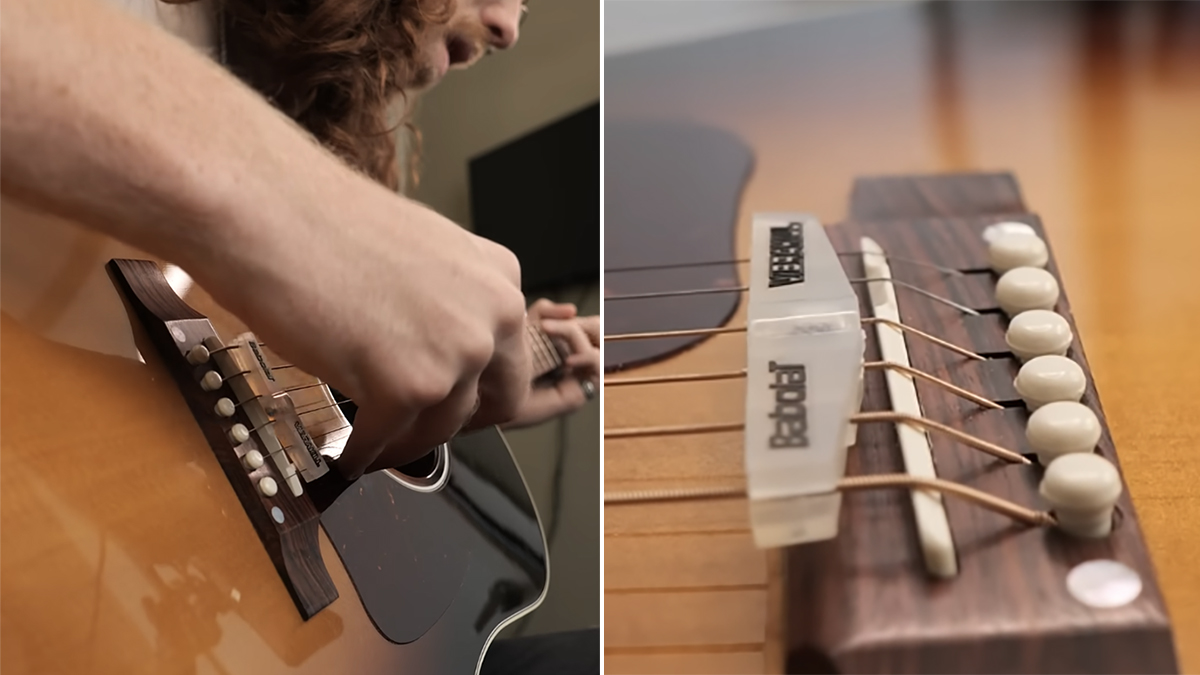“This little thing is probably the best guitar accessory you can buy”: Why TikTok is going nuts for a $12 tennis accessory

The rubber bridge guitar is one the biggest gear phenomena of recent years – and TikTok is currently going nuts over a tennis accessory that might be the best way to easily and cheaply recreate its hugely popular lo-fi tone on practically any guitar.
Loved by a huge ensemble of A-list artists – from Taylor Swift and Phoebe Bridgers, all the way to Bob Dylan, The National, Madison Cunningham and countless others – the rubber bridge guitar has become hugely popular throughout the 2010 and 2020s for its distinct tone.
That tone is created by (you guessed it) a rubber bridge, which works to dampen string vibrations, providing a more muted low-end tone and percussive string attack in the process.
The issue with these instruments is they’re rather hard to come by. They were pioneered by Reuben Cox, who fashioned rubber bridge guitars as custom builds out of his Old Style guitar store, and were (until very recently) only available through some fiddly and potentially expensive modding.
The release of the Orangewood Juniper – which I found to be a wholly eye-opening instrument – sought to help democratize the rubber bridge, but its $395 price tag still proves to be a barrier-to-entry.
As such, many casual players have been forced to find other means of achieving the rubber bridge vibe. One of the most popular methods, which did the rounds on TikTok last year, involves wrapping elastic bands around the strings.
However, there’s now a new method that’s been demonstrated by YouTuber AudioHaze, and it looks to be far superior in practically every way.
Get The Pick Newsletter
All the latest guitar news, interviews, lessons, reviews, deals and more, direct to your inbox!
As AudioHaze explains, it involves a Babolat Vibrakill – a small piece of inexpensive rubber that is conventionally used on tennis rackets to dampen vibrations when striking a ball. It fits onto the racket strings via open-ended slits, which allow the Vibrakill to be easily pushed on, and pulled off, where necessary.
Fortunately for guitar players, there are six slits on the Vibrakill, and the string-spacing between Babolat tennis rackets and (most) guitars are miraculously very similar indeed.
As such, the Vibrakill can be easily equipped to guitar strings just above the bridge, and hey presto – it does a very impressive job of muting the strings, and replicating the tone of a genuine rubber bridge.
The best thing is it’s completely reversible and totally non-invasive. The Vibrakill can just be thrown into a gig bag and pulled out whenever a rubber bridge guitar tone is required. It looks like it would work on both acoustic guitars and electric guitars, too.
“This little thing is probably the best guitar accessory that you can buy,” AudioHaze says. “This thing… to me, it sounds nearly identical to a rubber bridge, and costs around 12-15 bucks. When you’re done, you can just take it off.”
@lvnessvn ♬ original sound - Lanessan
For our two cents, it looks to be much better than the old rubber band trick, especially because the racket accessory can fit firmly and snug to the strings, and there’s no chance of it coming loose and getting in the way of strumming or picking.
TikTok seems to agree: the Vibrakill is practically everywhere, with players using it to channel the Swift/Bridgers vibe in their own videos.
The Babolat Vibrakill is available on Amazon, but unfortunately it's currently out of stock. Whether that’s because of tennis players or guitarists is unclear (we suspect the latter), so if you fancy giving it a go, you’ll just have to keep an eye out and wait for a restock.
There are some other tennis racket dampeners available, of course, but it might be a bit of a gamble to try anything other than the Vibrakill. On paper, anything with six slots should do the trick…
@hereiskinder ♬ original sound - Kinder

Matt is the GuitarWorld.com News Editor. He has a Masters in the guitar, a degree in history, and has spent the last 16 years playing everything from blues and jazz to indie and pop. When he’s not combining his passion for writing and music during his day job, Matt records for a number of UK-based bands and songwriters as a session musician.
“Wins out on battery life, stealthy aesthetics and its well-judged Cable Tone feature”: Blackstar Airwire i58 review
“A distinctive brightness that no other strings have been able to capture”: How Rotosound revolutionized the bass world with its Swing Bass 66 strings – and shaped the sound of rock music in the process











